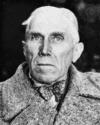- Papen, Franz von
-
born Oct. 29, 1879, Werl, Ger.died May 2, 1969, Obersasbach, W.Ger.German politician.He served as military attaché in Washington, D.C. (1913–15), but was recalled on espionage charges. A monarchist member of the German Reichstag (1921–32), he was chosen chancellor in 1932, but he was soon ousted by Kurt von Schleicher. In revenge, Papen persuaded Paul von Hindenburg to appoint Adolf Hitler as chancellor and himself as vice chancellor. Papen resigned in 1934 when he was unable to restrain the Nazis' push for power. As ambassador to Austria (1934–38), he worked for Austria's annexation to Germany. He was ambassador to Turkey (1939–44). Arrested in 1945, he was tried and acquitted at the Nürnberg trials; sentenced to prison by a German court as a Nazi, he was released on appeal in 1949.
 PapenCamera Press
PapenCamera Press* * *
▪ German statesmanborn Oct. 29, 1879, Werl, Ger.died May 2, 1969, Obersasbach, W.Ger.German statesman and diplomat who played a leading role in dissolving the Weimar Republic and in helping Adolf Hitler (Hitler, Adolf) to become German chancellor in 1933.The scion of a wealthy Catholic landowning family, Papen began his career as a professional soldier. At the beginning of World War I, he was military attaché in Washington, but after being implicated in cases of espionage and sabotage, he was recalled in 1915 at the request of the U.S. government. Until the end of the war he served as chief of staff of the 4th Turkish Army in Palestine. Returning after the war to Germany, Papen, a monarchist, decided to enter politics. From 1921 to 1932, he was a deputy in the Reichstag (federal lower house) and belonged to the ultraright wing of the Catholic Centre Party. Though he had certain links with German monarchists, former aristocrats, big business circles, and the German Army, Papen himself had no political following. His elevation to the chancellorship (June 1, 1932), engineered by Pres. Paul von Hindenburg's adviser Gen. Kurt von Schleicher (Schleicher, Kurt von), came as a complete surprise to the public.Papen established a rightist, authoritarian government without a political base or voting majority in the Reichstag. In an effort to appease the Nazis, who formed the second largest party in Parliament, he lifted the ban on the Nazis' paramilitary Sturmabteilung ( SA) on June 15 and deposed the Social Democratic government of Prussia on July 20. In foreign affairs, he achieved the virtual cancellation of Germany's reparations obligations under the Treaty of Versailles. Hitler, however, who wanted to rule Germany himself, remained in opposition. Papen's reactionary policies and his efforts to replace Germany's Weimar constitution with authoritarian rule alienated Schleicher, who wished to establish a broad national front that would have a real popular mandate. Accordingly, Schleicher induced a number of Cabinet ministers to reject Papen's policies; Papen thereupon resigned and was, on December 4, succeeded as chancellor by Schleicher.Incensed at his ouster and determined to gain revenge on Schleicher, Papen came to terms with Hitler (Jan. 4, 1933) and persuaded Hindenburg to appoint the Nazi (Nazi Party) leader to the chancellorship. As vice chancellor, Papen, whose fellow non-Nazi nationalists received a majority of the ministerial posts, naively thought he could restrain the Nazis. Though he soon realized how mistaken he had been, he continued to serve Hitler. Papen narrowly escaped with his life during Hitler's purge of the SA on June 30, 1934, and he resigned the vice chancellorship three days later. He was then sent as ambassador to Austria (1934–38), for whose annexation to Germany he worked. He eventually became ambassador to Turkey (1939–44), where he attempted to keep that country out of an alliance with the Allies.Papen was arrested by the Allies in April 1945 and placed on trial as a war criminal. Found not guilty by the Nürnberg tribunal of conspiracy to prepare aggressive war, he was sentenced to eight years' imprisonment by a German court as a major Nazi, but in 1949, on his appeal, was released and fined. Papen's memoirs, Der Wahrheit eine Gasse (Memoirs), appeared in 1952.* * *
Universalium. 2010.
